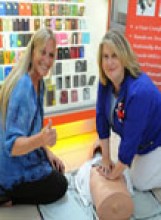Archive for November, 2014
Which is the Deadliest Day of the Year?
Posted by: | CommentsThough many days are in the running such as New Year’s Eve, New Year’s Day or Christmas Eve, the number one (1) deadliest day of the year, according to the American Heart Association is, Christmas Day or December 25th. This is the date with the highest number of heart attacks.
Believe it or not the second most deadliest day is December 26th, followed closely in third place by January 1st. December comes in as the most deadliest month of the year. Researchers have not been able to determine the specifics why December is the most deadly, but many hypothesize certain behaviors and outside influences can have an impact. Nonetheless, taking prudent actions during this holiday season can improve your risk. Consider the following suggestions:
Overeating and Drinking
Over consumption of higher fatty foods, increased levels of alcohol and salt to our diet, can put extra stress upon your digestive and heart systems. Enjoy these foods in moderation and try to balance your diet.
Weather
Cold weather is extremely hard on the heart. It increases blood pressure because of the constricting of the blood vessels due to the cold. Also blood clots occur more often in cooler temperatures. All this puts additional stress on your heart. Try and avoid too much physical exertion or strenuous exercise in cold environment.
Pressure Deadlines
The extra pressure of work deadlines as well as shopping adventures for gifts can increase the stress to the body. Again moderation and some type of balancing of these activities will help alleviate or reduce your stress levels.
Medications
When traveling to friends and relatives do not forget to pack your medications. This happens more times than not, and people will generally go without their medication for several days. Make sure to pack all medications as well as your physician’s phone number if you need him to call in an urgent RX for you when you are out of town.
Denial
Patients with symptoms of a heart attack in December are prone to just try and wish the symptoms away, or attribute them to some other cause. It’s the Holiday’s! Willfully ignoring the symptoms will not make them go away. Seek immediate medical attention. Delaying can make the situation much worse and even lead to death. Just because it is the holidays, do not think you are immune to a heart attack. If you have the symptoms call 9-1-1 immediately!
Which Seat is Safest on an Airplane?
Posted by: | CommentsWhere you sit can make a difference in surviving an air-crash. Most airlines and aeronautic experts say there isn’t a difference but, Popular Mechanics did a study of air crashes from 1971 and found some interesting information.
It is recognized that there are two times during an air flight when more accidents occur. In fact, over 75% of all accidents occur either during the take-off or the landing of the aircraft. But don’t let this fact deter you from flying. The statistics show that flying, by commercial aircraft, is 22 times safer than driving a motor vehicle on US roadways.
The type of crash can also have an influence, but in general the seats located towards the rear of the airplane had the best survival rates! Additional studies show that sitting within 5 rows of an exist also improved your chances of survival.
First class passengers may be more comfortable than the rest of the passengers, but the front of the plane has the lowest survival rates in air-crashes.
Here is the breakdown on survival rates:
First Class 49%
Ahead of Wing 56%
Over Wing 56%
Rear Cabin 69%
When making your next flight reservation you may want to consider these items. Dealing with motion sickness? You may want to consider a seat over the wings. These have been deemed the most stable with the least movement, but if you are looking for safety, then selecting a seat towards the rear of the plane as your best bet.
Best 7 Safety Tips for the Holidays
Posted by: | CommentsThe holidays are a time for families to celebrate and come together. It is also the time when hospitals report increases in the number of accidents and injuries. Now is the time to spend additional attention to your health and safety. Here are the best 7 safety tips for the holidays, to help keep you safe and healthy.
- Handling and Preparation of Food – Food poisoning can put a damper on the holidays. Make sure to wash your hands before handling any food items. Clean and/or disinfect all food preparation surfaces. Avoid cross-contamination especially with meats or fowl. Cook all foods to their proper temperatures and refrigerate left-over as soon as possible.
- Hand Washing – The best way to keep from getting sick and spreading germs is to wash your hands often. Plain soap and water is all you need. The use of a hand sanitizer will work when soap and water are not readily available. Avoid coughing or sneezing into your hands. The CDC now recommends that you cover your mouth or nose with your sleeve or into a disposable Kleenex, which is immediately thrown-away.
- Travel Safety – You have heard it a million times, don’t drink and drive. There is a reason why the Police and Highway Patrol increase their staffing during the holidays. Inclimate weather and holiday traffic, increase the opportunities for accidents. Allow extra driving time. You don’t want to resort to speeding or engage in reckless driving to make up time for leaving late or for unanticipated traffic delays. Always make sure everyone wears a seat-belt.
- Burns – Keep children out of the kitchen while preparing meals. Hot grease needs to be kept in a safe location. Pot handles should be pointed in and not left exposed away from the stove. This is an opportunity for kids to pull hot liquids down on them or adults accidentally bumping into the handles and spilling hot items on themselves or others. Cool all burns immediately with cool running water (no butter, lard, mayonnaise, egg, toothpaste or other home remedy). Small burns can be treated with an over-the-counter burn gel. Burns to the genitals, face or larger than 9% body area (about the size of your hand with fingers expanded) should be seen by a physician.
- Fires – Most residential fires happen in the winter months. Keep tree stands filled with water. Heated rooms can dry live trees out rapidly. Never leave candles, menorah’s, fireplaces, stoves or space heaters unattended. Check smoke detectors and replace batteries if it has been longer than 6 months. Have an emergency plan that is practiced with all family members. Children tend to hide when scared which makes it difficult to find them in smoky rooms. Teach them how to exit each room (have two solutions, such as the door or out a window) and have a rendezvous location outside of the home.
- Prevent Injuries – Use ladders and stools correctly instead of furniture when decorating. Hide or tape down with duct-tape all loose wires. Wear appropriate shoes when going outside. Rain, ice and snow can change the condition of walking surfaces. Use care and proper lifting techniques when lifting trees or large presents. Twisting or turning when lifting can cause falls and damage to your back. Nobody wants to spend their holidays in a hospital bed.
- Watch the Kids – This is an exciting time for the little ones. Their extra enthusiasm can put them into dangerous situation. Encourage their fun but in a safe manner. Give them toys appropriate for their age. Balloons, strings and ribbons are all potential suffocation or choking items for children under the age of 8. Have them dress properly before going outside. Always have them wear safety items such as helmets and knee or elbow pads when biking or using skates or skateboards.







